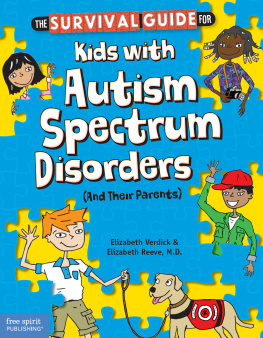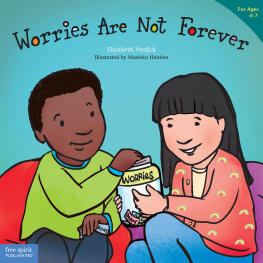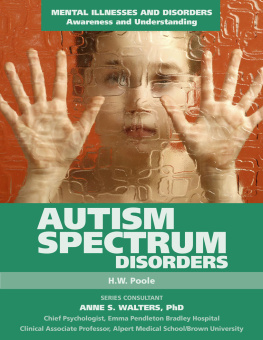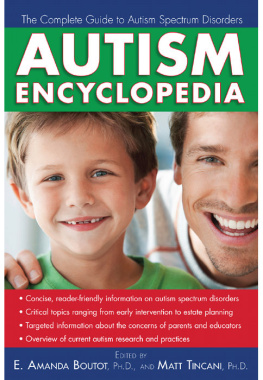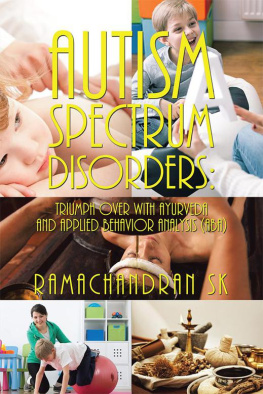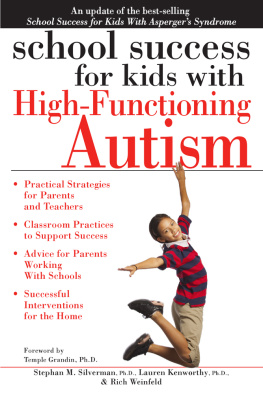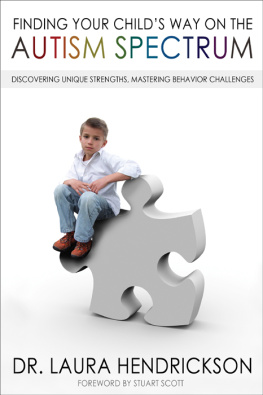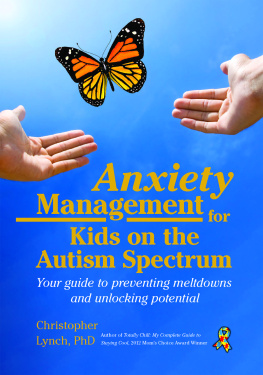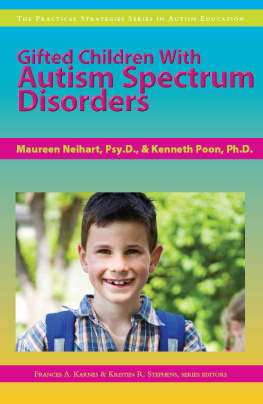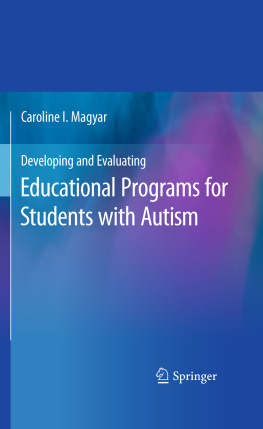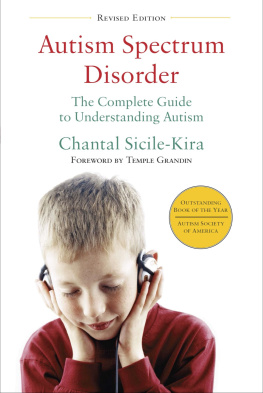[T]he authors lay a strong foundation in giving kids the ultimate skill of self-advocacy.
BOOKLIST
Should be one of the first books a family buys after a diagnosis it will be invaluable to so many children and their families.
CLAIRE LAZEBNIK , coauthor of Overcoming Autism and Growing Up on the Spectrum
Honest, kid-friendly with an upbeat can do spirit that never feels phony or pretentious. Its this constant current of ability, rather than disability, that sets this book apart from others geared to spectrum kids.
VERONICA ZYSK , coauthor of 1001 Great Ideas for Teaching and Raising Children with Autism or Aspergers
A fine and much needed guidebook for kids with autism spectrum disorders and their parents.
SPECIAL NEEDS BOOK REVIEW
Text copyright 2012 by Elizabeth Verdick and Elizabeth Reeve, M.D.
Illustrations copyright 2012 by Free Spirit Publishing.
All rights reserved under International and Pan-American Copyright Conventions. Unless otherwise noted, no part of this book may be reproduced, stored in a retrieval system, or transmitted in any form or by any means, electronic, mechanical, photocopying, recording, or otherwise, without express written permission of the publisher, except for brief quotations or critical reviews. For more information, go to www.freespirit.com/company/permissions.cfm.
Free Spirit, Free Spirit Publishing, and associated logos are trademarks and/or registered trademarks of Free Spirit Publishing Inc. A complete listing of our logos and trademarks is available at www.freespirit.com.
Library of Congress Cataloging-in-Publication Data
Verdick, Elizabeth.
The survival guide for kids with autism spectrum disorders (and their parents) / by Elizabeth Verdick & Elizabeth Reeve ; illustrated by Nick Kobyluch.
p. cm.
ISBN 978-1-57542-385-2 (pbk.)ISBN 978-1-57542-674-7 (ebook) 1. Children with autism spectrum disordersJuvenile literature. 2. Autistic childrenFamily relationshipsJuvenile literature. 3. Parents of autistic childrenJuvenile literature. I. Reeve, Elizabeth. II. Kobyluch, Nick, ill. III. Title.
RJ506.A9V466 2012
618.92'85882dc23 | 2011046520 |
ePub ISBN: 978-1-57542-526-9
Free Spirit Publishing does not have control over or assume responsibility for author or third-party websites and their content. At the time of this books publication, all facts and figures cited within are the most current available. All telephone numbers, addresses, and website URLs are accurate and active as of March 2014. If you find an error or believe that a resource listed here is not as described, please contact Free Spirit Publishing. Parents, teachers, and other adults: We strongly urge you to monitor childrens use of the Internet.
Note: The names of some children described in this book have been changed to protect their privacy.
Reading Level Grade 5; Interest Level Ages 813; Fountas & Pinnell Guided Reading Level T
Edited by Marjorie Lisovskis
Cover and interior design by Michelle Lee
All illustrations by Nick Kobyluch, except illustrations by Michelle Lee
istockphoto.com / Leontura
Rosalie Winard
Free Spirit Publishing Inc.
Minneapolis, MN
(612) 338-2068
help4kids@freespirit.com
www.freespirit.com
Free Spirit offers competitive pricing.
Contact edsales@freespirit.com for pricing information on multiple quantity purchases.
Dedication
To Nancy, Cara, and Trish: You were there in the beginning and you helped bring us further than we imagined possible. Forever grateful, EV
To all the patients and families I have worked with over the past 20 years. You have each taught me something! ER
Acknowledgments
For their careful and thoughtful reviews of the manuscript for this book, thanks go to Cindy Kaldor, autism behavior consultant for the Osseo School District; Kim Klein, Ph.D., pediatric neuropsychologist with Fraser Child and Family Center; Amy Nygaard, attending child and adolescent psychiatrist at Regions Behavioral Health, Woodbury, Minnesota; Pat Pulice, director of Fraser Autism Services; Linda Sieford, Ph.D., family and educational consultant and adjunct faculty in psychology; Angela Henchen; Mary Stefanski; and Daniel Stefanski.
We also send out a huge thank you to all the kids, teens, moms, and dads who took the time to tell us their thoughts about life on the spectrum.
Contents
Introduction for Kids
Have you ever sensed youre different somehow? Maybe you dont seem to fit in with the kids at school or in your neighborhood. You look around and see them talking, laughing, texting, and living life at a different speed than you are. Perhaps you even feel out of step within your own family.
Or, maybe you dont feel so different but other kids treat you as if you are. They may tease you, stare, shy away from you, or tell on you for behaving in ways you didnt even know were wrong. Whats going on? Youre special in some way, but how?
This book is about discovering why youre different. Like many people, you have some special skills and gifts. But you also have some special needs. More specifically, you have a condition known as autism spectrum disorder, or ASD. The will explain it more.
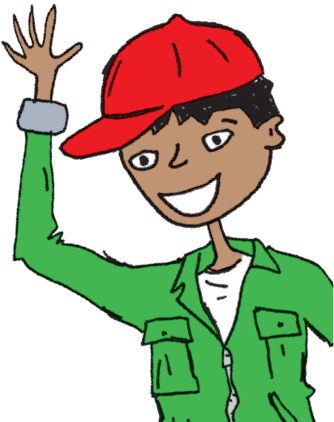
ASDWhat Do These Initials Mean?
ASD is the short and simple way to say autism spectrum disorder. But ASD is far from simple.
You probably noticed that the word autism is part of ASD. So, what is autism? Doctors and other professionals use this word to describe brain disorders that affect how you think, learn, communicate, and behave.
Autism is part of a diagnosis known as PDD (more initials!). PDD stands for pervasive developmental disorders. Pervasive , in this case, means that something affects your body, mind, and overall health. The word developmental describes how you grow over time. Disorder means a difference in how you function. Having PDD or PDD-NOS (not otherwise specified) means your development will be different from that of many other kids. Aspergers syndrome (AS) is also a form of ASD. Whether your medical charts and school records say autism, AS, PDD, PDD-NOS, or ASD, this book can help you.
Some experts use the term high-functioning autism (HFA) as well. Someone with HFA can learn and communicate to a higher degree than someone with low-functioning autism (LFA).
More and more, doctors and other experts are using the term ASD for all people with autism or Aspergers syndrome. Throughout this book, we mainly use the terms autism spectrum disorder and ASD.
(Hope thats A-OK with you.)
Learning that you have ASD can be a confusing experienceand wed like to make it easier for you. We want to tell you Its going to be okay. And it is. That doesnt mean its going to be super simple or problem free, though. We wish it could be. But life is hardly ever super simple and problem free.
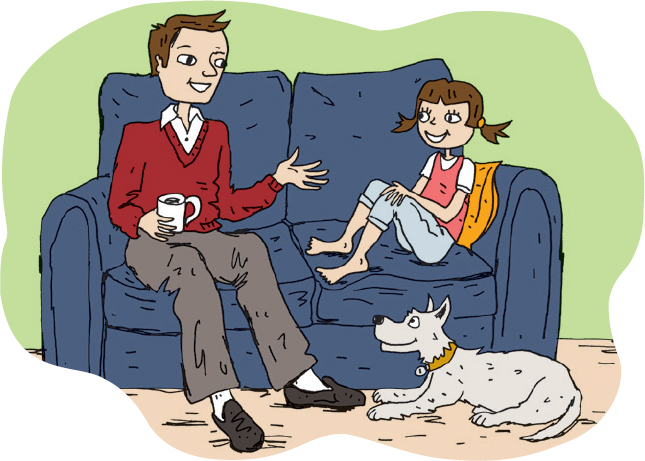
We wrote this book to help you better understand your needs and differences. We hope it will help you with daily issues, such as your feelings, behavior, and communication with other people. We recommend that you read the book with an adult, even if youre already a strong reader. Why? Because reading with a parent or another grown-up who cares about you is an important way to get support. An adult can answer your questions and help you try out the ideas and tips.

